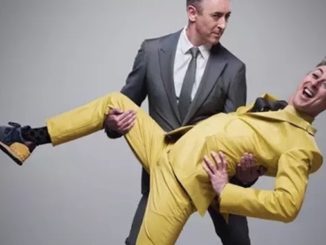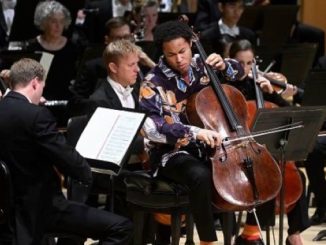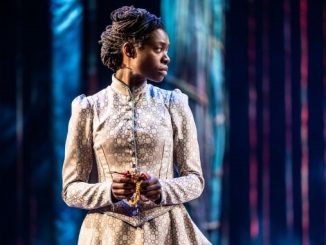The (perhaps too) thematically relevant National Arts Centre Orchestra concert, “Truth In Our Time”, brought film composers, and more film composers, to Roy Thomson Hall on March 30, 2022. Truth In Our Time, conceived as a “meditation on truth and how it is told”, has been making its way across the 49th parallel, with performances in Ottawa, Toronto, and an upcoming show at New York City’s Carnegie Hall.

Nicole Lizée’s opening piece, Zeiss After Dark, is a co-commission of the NACO and TSO. Inspired by the camera lens(!) used in Stanley Kubrick’s cinema classic Barry Lyndon, this two-minute concoction was originally composed for Canada’s sesquicentennial celebrations in 2017. Canadian composer Lizée is known for her affection for, and experimentation with, unusual multimedia forms (past works have involved such instruments as the Atari 2600). Zeiss is a much more staid affair, with a lyrical, if contemporary, throughline, though it was unusual in at least one respect: several non-percussion musicians were required to set down their instruments and clap along awkwardly.
Speaking of lyrical, Shostakovich’s Symphony No. 9 in E-flat major, Op. 70 was an interesting, potentially controversial choice for the evening. Commissioned in 1945 by Stalin’s Soviet Union to commemorate the defeat of Hitler and triumph over Nazism, it’s also, unavoidably, a celebration of Russian militarism. To be fair to Shostakovich and to the NACO, Shosty himself was famously (and repeatedly) denounced by the Soviet regime, while Symphony No. 9 was censured by Soviet critics for “ideological weakness” due to its subversive aspects, such as a military theme that ends up sounding an awful lot like circus music. From a purely musical standpoint, however, it is a marvelous, light-hearted masterwork, its exciting opening and closing sections broken up by a beautiful, contemplative wind melody in the second movement. The flute, clarinet, and bassoon solos were a highlight.
Shostakovich, renowned as a symphonic composer in his own right, was also a well-known film composer, composing scores for 36 films in his lifetime. Appropriately enough, Truth In Our Time’s second major piece of the evening was the Violin Concerto in D major, Op. 35 from legendary film composer Erich Korngold. Like Shostakovich’s Symphony No. 9, the Korngold concerto was composed in 1945, although it would not debut until 1947, with Jascha Heifetz on the violin. The concerto is adapted from themes Korngold originally composed for several films starring Erroll Flynn and Olivia de Havilland, including such long-forgotten titles as Anthony Adverse and The Prince and the Pauper. Written in a neo-Romantic style, the concerto is really an opportunity for showmanship – and, from guest soloist Blake Pouliot, a bit too much showboating – across three virtuosic movements. Pouliot’s extravagant performance style – the man has a lovely head of hair, and we certainly got to see it fly about – were largely justified by the flowery music, even as his antics sometimes distracted from the beauty, and technically demanding quality, of the piece, especially during its vivace finale.
Closing out the evening was a world premiere from another film composer. Phillip Glass is, of course, so much more than that, with a remarkable oeuvre encompassing everything from film to opera to symphony to popular music. One of the most important and influential composers of the 20th century, his minimalist, deliberately repetitive composition style has influenced such disparate musicians as composer Michael Nyman and the band Coldplay. Glass’s Symphony No. 13 (2022) was commissioned in memory of the late Peter Jennings, the Canadian-born news anchor who passed away in 2005. The eighty-five-year-old Glass has lost little of his magic touch, even if this new symphony closely resembles much of his half-century’s worth of compositions. From its stirring opening through its striking climax – my concert companion was overwhelmed by the cascade of crescendoing chords, which reverberated long after the conclusion – Symphony No. 13 is the epitome of everything Glass is heralded for. Still, while I like Glass, and it’s remarkable that he’s still producing work comparable to anything he’s done before, I don’t love Glass. His unchanging approach, to a musical form itself built around minimal gradation, can wear thin, especially when programmed alongside the dynamism of a Shostakovich. I’m not convinced this latest symphony sounded anything like Peter Jennings or “free speech”, as suggested by the program notes, but it was enjoyable and exciting, and enthusiastically received by a packed audience.
***
Visit the official website for the National Arts Centre Orchestra here.



